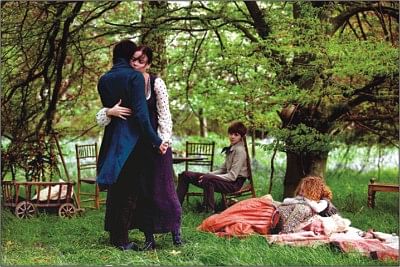Bright Star: An ode to Keats, Love

“Bright Star” depicts the three-year courtship and truncated love affair of Fanny Brawne and the doomed poet John Keats.
An ode to love and artistic inspiration, the period film “Bright Star” marks a return to form for Jane Campion (“The Piano,” “An Angel at My Table,” “The Portrait of a Lady”). The film spans the years between 1818 and 1821 and depicts the three-year courtship and truncated love affair of spirited young Fanny Brawne (Abbie Cornish), a seamstress and dress designer who today would have been another Vivienne Westwood, and the doomed poet John Keats (Ben Whishaw).
A giant of the Romantic period, Keats was the author of such hugely influential works as “Ode on a Grecian Urn” and “La Belle Dame Sans Merci” (the film takes its title from the Keats sonnet “Bright Star”). Keats, who died a year before Shelley, was also an archetypal Romantic hero, an artist dead at 25.
He was his own “Endymion,” sent prematurely to his eternal rest. As played by the ferrety and wraithlike Whishaw (“Perfume,” “Brideshead Revi-sited”), he is arguably never as alive as he should be. In contrast, Cornish's Fanny is so plumply brimming with life she seems more succubus than muse.
Still, the film, also written by Campion with research from a Keats biography by Andrew Motion, captures the intersection of life and art astutely. Keats lives and works with friend and fellow poet Charles Armitage Brown (a marvellously nasty, if ultimately tedious Paul Schneider), who is jealous of the “ignorant” Fanny and makes his contempt for her plain.
Fanny lives with her sweet mother (Kerry Fox of “An Angel At My Table”), serious younger brother Samuel (Thomas Sangster) and charming little sister “Toots” (Edie Martin).
If the film is occasionally in danger of being upstaged by a cacophony of outlandish hats and beribboned bonnets, it is also charged with an erotic current, however unconsummated.
“Poems are a strain to make out,” laments Fanny, who reads “Endymion” (“A thing of beauty is a joy forever,” etc.) in order to determine whether this Keats “is an idiot.”
After they fall in love, Keats acknowledges he cannot ask Fanny to marry him because he has “no living and no income.” She for her part will not let him go. But as his health deteriorates they face the permanent separation of death.
It is not easy to say whom Campion relates to more, the dying artist or his “bright star” and enthralling belle dame.
“Bright Star” makes a strong, “Piano”-like case that love and nature are art's progenitors, and that the three are engaged in an eternal ménage à trois. If death is never far away, John and Fanny are also surrounded by teeming life: the flowers, insects and “winged dryad” of the trees.
Campion also makes it clear that unsurpassed among these natural splendours is Cornish's magnificent profile. It is a thing of beauty.
Compiled by Cultural Correspondent

 For all latest news, follow The Daily Star's Google News channel.
For all latest news, follow The Daily Star's Google News channel. 



Comments